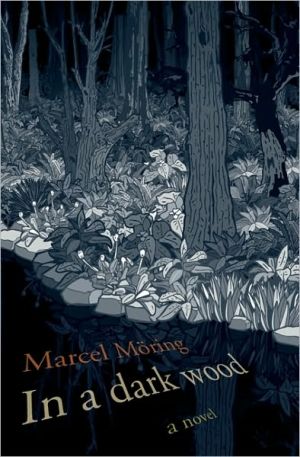

 |

|

The average rating for In a Dark Wood based on 2 reviews is 3 stars.
Review # 1 was written on 2013-10-02 00:00:00 Steve locke Locke Steve locke LockeMöring deserves to be much more widely read. All you BBB (Big Brainy Book) readers who've yet to venture along the path to the wood, get thee onmiddelijk naar een Bookery and be prepared for verrukking. The blurb does not disappoint. The usual hi-jinx of free-wheeling typography, po-mo antix, literary allusion, delusion and collusion with the maestri of yore abound, but these are subtle rather than salacious, reflecting the author's exuberance in the form rather than any overt intent to impress with undoubted erudition. It's there, but isn't the οὐ κινούμενον κινεῖ, and a less-well-read reader should not be daunted (Theroux, move over, although you're still loved (for your vocabulary, at least)). On the form side, time weaves backwards and forwards something like the threads in a tapestry (the tapestry that is the last century's history of Europe) through a considered and judicious use of the full range of tenses* available to depict the nuances of action, thought, intention, imagination, dreaming, history, the unknown, the bemoaned, the as-yet-to-pass-as-it-was-envisioned-in-the-past, the future, combining cleverly at times a distanced narrative, free indirect discourse, dialogue, and what by now has become (thankfully) standard fare (in appreciation for what film has done for the written word) a director's camera observing details which shade but never bore. Note also that the dreadful beast of interpolating, extrapolating and heavily polemicising author is refreshingly absent, achieved by the protagonist narrating in the guise of his (and her) time-influenced, experience-wrought selves (see Proust for the ultimate in this effect). Commentary rests squarely with the WYSIWYG character(s), owning (and controlling) the story. For story it is. Content-wise, this is a sly twist on the reality that is not only Europe's shame, but which has its seeds, like the destructive power of every institutionalised religion whose intent is not to succor the spiritually malnourished or weak but gather them to its chest as bulwark and crusaders for its own manipulation and self-avowal, in a history that is not directly referenced but which informs all of the attitudes, responses, thoughts and deeds which follow in the wake of that reality's inception. And by the dubious virtue of its long and illustrious history, is the creation of that shame carefully centred on Europe, when the shoulders which should bear this burden are much more diasporally diffused. But that sounds far more dire than rendered by Möring: satirically, ironically, comically, visually, and sensually. In short, a thoroughly ripping good romp of yarn that doubles as a history lesson (of sorts, with caveats) for those unfamiliar with a Dutch perspective on the last hundred years (then and now) of Our Glorious Civilisation. *One review complains of the use of pluperfect (past perfect) tense being unsuited to American tastes. *raises eyebrows* It's part of the fabric of what Möring achieves. Like suggesting that three-dimensional drawings be rendered as two-dimensional. Such a complaint indicates a profound lack of understanding of how tense functions to telescope, macroscope, and nanoscope the text, the rendition of the character (whether in first person or third person perspective), and the sense of time receding and returning via events. |
Review # 2 was written on 2018-09-27 00:00:00 Todd Mccallum Todd MccallumThe Dutch author Marcel Möring with 'In Babylon' (1997) had awakened great expectations about his further literary evolution. With 'Dis' (2006), the first part of a trilogy that clearly refers to Dante, he has severely disappointed me. The story of 'Dis' takes place in Assen, a town in the north of the Netherlands. Several storylines are connected to each other, with the themes of post-holocaust emptiness and the walking Jew as central elements. That looks like a promising concept, but Möring has made a mess of it, I cannot describe it any differently. Especially stylistically, the book is a real failure: it seems that Möring just wanted to demonstrate how erudite he was, how many literary references he could put into a single book (and play with them), and how many different styles he could handle. Already in the first 150 pages I recognized Joyce, Döblin, Svevo, and Becket, and of course Dante and Homer are directly and indirectly referred to in detail. And then it even aren't subtle references: Möring has followed his models into the extreme, with continuous repetitions, to the point of annoyance. Even the experiments with the typography fall dead on a cold stone. Stylistic excess harms, and even more so when it's detrimental to the content: Moring's main characters, both Jewish, keep on repeating that our earthly existence is a vale of tears, that everything is only emptiness (yes, Ecclesiastes!). And consequently, despite their active wanderings, the protagonists lead a lonely and hopeless existence. Maybe this was intended as a brilliant variation on the 'Inferno' of Dante, but I became utterly annoyed by this book and quickly put it aside. |
CAN'T FIND WHAT YOU'RE LOOKING FOR? CLICK HERE!!!